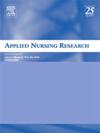Professional quality of life influences sleep and well-being in nurses: A cross-sectional study
IF 2.7
4区 医学
Q1 NURSING
引用次数: 0
Abstract
Background
Nurses' quality of life (QoL) significantly influences their physical and mental health. However, limited research has examined the relationship between professional QoL, sleep disturbance, and well-being in this population.
Methods
This descriptive, cross-sectional study investigated the associations among professional QoL (compassion satisfaction and compassion fatigue), sleep quality, and subjective well-being in nurses. A total of 978 registered nurses completed the Professional Quality of Life Scale (Version 5), the Athens Insomnia Scale, and the Index of Well-Being. Data were analyzed using descriptive statistics, Pearson correlation coefficients, and multiple linear regression.
Results
Higher levels of compassion satisfaction were associated with lower levels of sleep disturbance and higher well-being. In contrast, burnout and secondary traumatic stress were negatively associated with well-being and positively associated with sleep disturbance. Regression analyses identified physical condition, burnout, and compassion satisfaction as significant predictors of well-being. Physical condition, burnout, and secondary traumatic stress significantly predicted sleep disturbance.
Conclusions
Interventions aimed at reducing compassion fatigue, enhancing physical fitness, and promoting compassion satisfaction – both individually and organizationally may improve sleep quality and well-being among nurses.
职业生活质量对护士睡眠和健康的影响:一项横断面研究
背景护士的生活质量对其身心健康有显著影响。然而,有限的研究调查了这一人群的职业生活质量、睡眠障碍和幸福感之间的关系。方法采用描述性横断面研究,调查护士职业生活质量(同情满意度和同情疲劳)、睡眠质量和主观幸福感之间的关系。共有978名注册护士完成了职业生活质量量表(第5版)、雅典失眠症量表和幸福感指数。数据分析采用描述性统计、Pearson相关系数和多元线性回归。结果高水平的同情满意度与低水平的睡眠障碍和高水平的幸福感相关。相反,倦怠和继发性创伤应激与幸福感呈负相关,与睡眠障碍呈正相关。回归分析确定了身体状况、倦怠和同情满意度是幸福的重要预测因素。身体状况、倦怠和继发性创伤应激显著预测睡眠障碍。结论以减轻同情疲劳、增强身体素质和促进同情满意度为目标的干预措施,无论是个人还是组织,都可以改善护士的睡眠质量和幸福感。
本文章由计算机程序翻译,如有差异,请以英文原文为准。
求助全文
约1分钟内获得全文
求助全文
来源期刊

Applied Nursing Research
医学-护理
CiteScore
4.50
自引率
0.00%
发文量
65
审稿时长
70 days
期刊介绍:
Applied Nursing Research presents original, peer-reviewed research findings clearly and directly for clinical applications in all nursing specialties. Regular features include "Ask the Experts," research briefs, clinical methods, book reviews, news and announcements, and an editorial section. Applied Nursing Research covers such areas as pain management, patient education, discharge planning, nursing diagnosis, job stress in nursing, nursing influence on length of hospital stay, and nurse/physician collaboration.
 求助内容:
求助内容: 应助结果提醒方式:
应助结果提醒方式:


